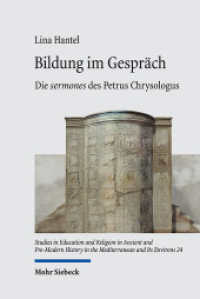- ホーム
- > 洋書
- > 英文書
- > Religion / Ethics
Full Description
According to Augustine's doctrine of original sin, Adam's progeny share a collective guilt which, like an infection, spreads through wayward sexual desires, passing from parent to child. But is it fair to blame sinners if they inherit evil like a disease? Stricken by Sin clarifies the logic and illogic of the controversial views about human agency Augustine defended in his later years. The first half of the book examines why Augustine believed we are trapped by evil, and why only Christ can save us. Couenhoven focuses on Augustine's debates with the Pelagians about whether we control our personal identities, what we should be held culpable for, and whether freedom is compatible with necessity. The second half of the book offers a philosophically and scientifically astute retrieval of some of Augustine's most divisive claims. Couenhoven makes a case for the surprising thesis that a carefully formulated doctrine of original sin is profoundly humane. The claim that sin is original takes seriously our dependence on one another for essential aspects of character and personality, our ownership of cognitive and volitional states that are not simply products of voluntary choices, and our status as personal agents of evil. Attending to these aspects of our lives challenges the idea that each individual's moral and spiritual standing is up to her or him, and drives us to ponder not only the shape of the freedom we seek and the nature of our responsibility, but also the need for grace we all share.
Contents
Contents ; Acknowledgements ; Abbreviations ; Introduction ; Reaping What We Did Not Sow: Original Sin and Responsibility ; I. The Scandal of Original Sin ; II. On Responsibility ; III. Chapter Overview ; Part I: Augustinian Doctrines ; Chapter 1: Peccatum Originale ; Chapter 2: The Explanatory Power of Original Sin ; Chapter 3: Sickness, Sin, and Augustine's Compatibilism ; Part II: Ownership and Inheritance ; Chapter 4: An Augustinian Conception of Responsibility ; Chapter 5: Augustinian Compatibilism ; Chapter 6: Responsibility without Freedom ; Chapter 7: Responsibility Under Necessity ; References








